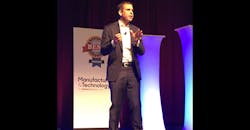Data Is the Heart of Smarter Manufacturing
Which is the more asset-intensive enterprise – Chrysler or Uber? If your answer is Chrysler, then Lou Rassey likely disagrees.
Rassey, founder and CEO of additive manufacturing solutions provider Fast Radius, suggests that if you consider data an asset, then transportation network company Uber likely has the automaker beat.
And data is an asset, he says.
"That is arguably the biggest paradigm shift" in the digital age, and while it might be tough to accept, manufacturers must "embrace" the idea and then determine how to combine data with physical assets "to create competitive advantage," he said.
Rassey shared these thoughts and more during a keynote address Tuesday at Manufacturing & Technology, an IndustryWeek event. His topic: Digital Lessons from North America's 'Smartest' Factory.
The Fast Radius CEO is in a position to know. His company, in tandem with logistics partner UPS, was identified by the World Economic Forum last year as one of nine best manufacturing factories in the world based on a successful track record of implementing technologies of the Fourth Industrial Revolution. It was the only North American site named to that list.
The contract manufacturer produces parts using a variety of processes -- most notably additive – and promises speed in delivery, as well as quality. On Tuesday Fast Radius reported that it had received $48 million to expand its platform for production-grade additive manufacturing.
During his talk at M&T, Rassey outlined the global forces at play in manufacturing, including demand shifts; factor impacts including decreasing costs and the hunt for talent; policy changes, such as increasing governmental intervention; and competition moving from low-cost locations to truly global locations, as well as "the blurring of manufacturing and services."
These forces and more, he said, call for new ways to design and make things.
"Massive value is at stake," Rassey said. Among the numbers he threw out: The value derived from data could reach $10 trillion in the not-too-distant future.
And, of course, additive manufacturing is a piece of that future. The Fast Radius CEO spoke about several current uses and future promise of additive, including a recent announcement by football helmet manufacturer Riddell. That company has partnered with Carbon to produce 3D-printed helmet liners.
New materials and new digital tools are hastening the move of additive from prototype applications to full production, Rassey noted.
Moreover, the advent of digital processes and growth of data as an asset has other, profound implications for manufacturing. The Fast Radius CEO suggests this combination introduces a new mode of logistics, likened to a virtual warehouse, where data is stored in the cloud and parts are made on demand.
It's a business model innovation Fast Radius has embraced.
Rassey pointed out additional examples of the digital thread at work today, including Amazon Elements, which provides extreme sourcing transparency, and the Echo, basically a digital assistant.
"Manufacturing is on the brink" of transformation, and it's a "cause for great excitement," the Fast Radius CEO said.
It will change what companies ask engineers to do and how leaders set strategy, Rassey said.
He concluded his talk by outlining the key mindset of leaders facing disruptive change:
- Relentless outward focus
- Take action and be agile
- Optimism.
About the Author
Jill Jusko
Bio: Jill Jusko is executive editor for IndustryWeek. She has been writing about manufacturing operations leadership for more than 20 years. Her coverage spotlights companies that are in pursuit of world-class results in quality, productivity, cost and other benchmarks by implementing the latest continuous improvement and lean/Six-Sigma strategies. Jill also coordinates IndustryWeek’s Best Plants Awards Program, which annually salutes the leading manufacturing facilities in North America.
Have a story idea? Send it to [email protected].

